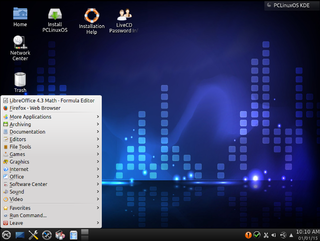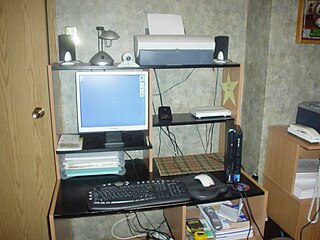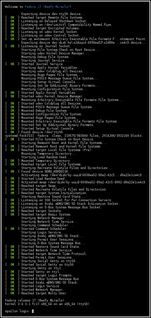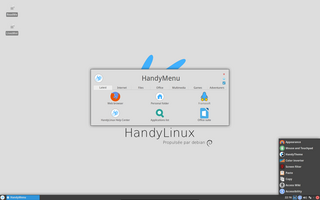
A Linux distribution is an operating system made from a software collection that is based upon the Linux kernel and, often, a package management system. Linux users usually obtain their operating system by downloading one of the Linux distributions, which are available for a wide variety of systems ranging from embedded devices and personal computers to powerful supercomputers.
Gentoo Linux is a Linux distribution built using the Portage package management system. Unlike a binary software distribution, the source code is compiled locally according to the user's preferences and is often optimized for the specific type of computer. Precompiled binaries are available for some larger packages or those with no available source code.

KNOPPIX is an operating system based on Debian designed to be run directly from a CD / DVD or a USB flash drive, one of the first of its kind for any operating system. Knoppix was developed by, and named after, Linux consultant Klaus Knopper. When starting a program, it is loaded from the removable medium and decompressed into a RAM drive. The decompression is transparent and on-the-fly.

A live CD is a complete bootable computer installation including operating system which runs directly from a CD-ROM or similar storage device into a computer's memory, rather than loading from a hard disk drive. A Live CD allows users to run an operating system for any purpose without installing it or making any changes to the computer's configuration. Live CDs can run on a computer without secondary storage, such as a hard disk drive, or with a corrupted hard disk drive or file system, allowing data recovery.

Damn Small Linux (DSL) is a computer operating system for the x86 family of personal computers. It is free and open-source software under the terms of the GNU GPL and other free and open source licenses. It was designed to run graphical user interface applications on older PC hardware, for example, machines with 486 and early Pentium microprocessors and very little random-access memory (RAM). DSL is a Live CD with a size of 50 megabytes (MB). What originally began as an experiment to see how much software could fit in 50 MB eventually became a full Linux distribution. It can be installed on storage media with small capacities, like bootable business cards, USB flash drives, various memory cards, and Zip drives.

A bootable business card (BBC) is a CD-ROM that has been cut, pressed, or molded to the size and shape of a business card. Alternative names for this form factor include "credit card," "hockey rink," and "wallet-size". The cards are designed to hold about 50 MB. The CD-ROM business cards are generally used for commercial product demos, are mailed to prospective customers, and are given away at trade shows.

Seth David Schoen is senior staff technologist for the Electronic Frontier Foundation, a technology civil rights organisation, and has been actively involved in discussing digital copyright law and encryption since the 1990s. He is an expert in trusted computing.

PCLinuxOS, often shortened to PCLOS, is an x86-64 Linux distribution, with KDE Plasma Desktop, MATE and XFCE as its default user interfaces. It is a primarily free software operating system for personal computers aimed at ease of use. It is considered a rolling release.
Levanta was a company based in San Mateo, California, United States, that created products for Linux management and data virtualization.

Linux for PlayStation 2 is a kit released by Sony Computer Entertainment in 2002 that allows the PlayStation 2 console to be used as a personal computer. It included a Linux-based operating system, a USB keyboard and mouse, a VGA adapter, a PS2 network adapter, and a 40 GB hard disk drive (HDD). An 8 MB memory card is required; it must be formatted during installation, erasing all data previously saved on it, though afterwards the remaining space may be used for savegames. It is strongly recommended that a user of Linux for PlayStation 2 have some basic knowledge of Linux before installing and using it, due to the command-line interface for installation.

CHAOS is a small Linux distribution designed for creating ad hoc computer clusters. CHAOS is a Live CD which fits on a single business-card-sized CD-ROM. This tiny disc will boot any I586 class PC into a working OpenMosix node, without disturbing or touching the contents of any local hard disk.

Finnix is a Debian-based Live CD operating system, developed by Ryan Finnie and intended for system administrators for tasks such as filesystem recovery, network monitoring and OS installation. Finnix is a relatively small distribution, with an ISO download size of approximately 100 MiB, and is available for the x86 and PowerPC architectures, and paravirtualized systems. Finnix can be run off a bootable CD, a USB flash drive, a hard drive, or network boot (PXE).

A live USB is a USB flash drive or external hard disk drive containing a full operating system that can be booted. They are the evolutionary next step after live CDs, but with the added benefit of writable storage, allowing customizations to the booted operating system. Live USBs can be used in embedded systems for system administration, data recovery, or test driving, and can persistently save settings and install software packages on the USB device.

Software remastering is software development that recreates system software and applications while incorporating customizations, with the intent that it is copied and run elsewhere for "off-label" usage. The term comes from remastering in media production, where it is similarly distinguished from mere copying.

Calculate Linux is a Linux distribution optimized for rapid deployment in a corporate environment. It is based on the Gentoo project and includes numerous pre-configured functions.

systemd is a software suite that provides an array of system components for Linux operating systems.

Porteus is a portable operating system based on Slackware. It does not require installation and can be run from fixed and removable media, such as a USB flash drive or compact disc.

HandyLinux is a Linux distribution originating in France and derived from the Debian stable branch. It is designed especially with inexperienced computer users in mind. The distribution has low system requirements, allowing it to be used on a range of older hardware that is no longer supported by the latest versions of proprietary operating systems. It is aimed particularly at older people with dated hardware who do not need or possess the skill to use many features afforded by state-of-the-art operating systems. It may also be useful for computer users with disabilities, such as visual impairment.
















